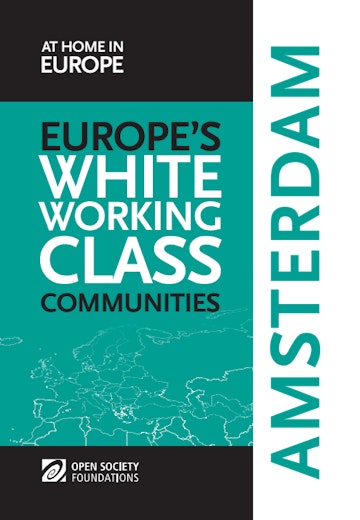More Emphasis on Local Engagement and Education Needed in Amsterdam-North to Tackle Marginalization
AMSTERDAM—Austerity measures, changes to the welfare state, unequal investment that has left certain districts behind and challenges in education are fueling a sense of marginalization among people of Dutch heritage—or the white working class, as termed elsewhere in Europe—in Amsterdam-North. New research finds that despite these challenges, traditions of self-help and mutual support, a strong sense of local identity, and early successes by the local sub-municipality suggest more local approaches and consultation could help.
Europe’s White Working Class Communities, launched by the Open Society Foundations, examines the daily experiences of six communities in Western Europe, including Amsterdam, and their views on a range of issues including employment, health, education, housing, politics, and media.
“This report focuses on the neighborhoods of Tuindorp Buiksloot and Floradorp in Amsterdam-North, both with populations that are primarily of Dutch heritage, though there are parallels with similar communities across Europe,” says Nazia Hussain, director of Open Society Foundations’ At Home in Europe project. “In addition to recognizing and strengthening local engagement, education must be seen as an opportunity rather than a struggle if marginalization is to be addressed; strengthening parental engagement, increasing pupil aspirations and teacher expectations, and better use of data can all help.”
Other findings in the report include:
- The Amsterdam sub-municipality has developed positive approaches to addressing key issues in the community such as tackling school dropout rates adopting an integrated anti-poverty approach, and supporting self-employed people.
- There is increased vulnerability to poverty, among the inhabitants of these communities in Amsterdam-North, due to the impact of the economic crisis and austerity measures. Support for local businesses is needed to help the community’s economic resilience and vitality.
- People expressed a strong sense of neighborhood identity, while also saying that they felt like they belonged to the city as a whole—though some felt this sense of belonging was not mutual.
- Some people felt that increasing diversity—whether through migrants or “yuppies”—was threatening their “way of life.” Respondents pointed to what they viewed as an inability of newcomers to adapt to unspoken codes of behavior, such as greeting people in the street, and contributing to the existing community spirit.
- There are lots of ideas and energy among the youth in Amsterdam-North about how to effect change; this clashes with the centralized youth policy from Amsterdam City Council—more localized approaches are needed.
- Some inhabitants avoided basic healthcare such as dentists’ visits due to financial uncertainty.
In response to the report, Coby van Berkum, mayor of the Amsterdam-North sub-municipality, commented, “To promote inclusion and avoid segregation we need to invest in education and work. The ambition of Amsterdam’s North district is to reduce school dropout rates from thirteen to eight percent over the next four years. To avoid youth unemployment we are intensifying our relationships with the local trade and industry.”
###
The Open Society Foundations work to build vibrant and tolerant societies whose governments are accountable to their citizens. Working with local communities in more than 100 countries, the Open Society Foundations support justice and human rights, freedom of expression, and access to public health and education.
